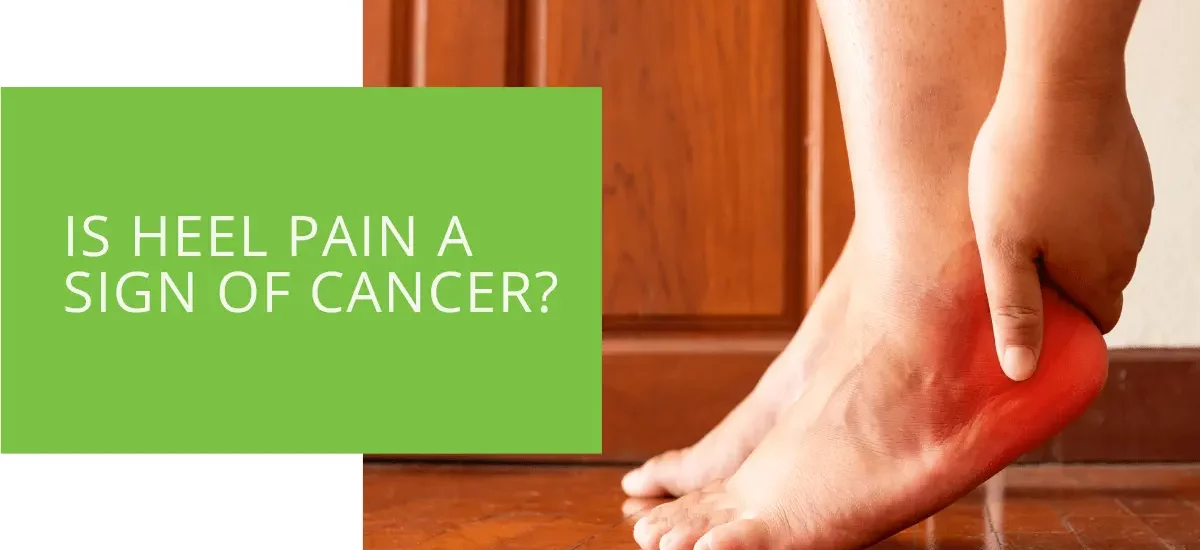


Heel pain is a common complaint that can arise due to a multitude of factors, ranging from mechanical issues to medical conditions. Among the concerns occasionally raised is the potential link between heel pain and cancer. While the vast majority of heel pain cases stem from benign causes, it’s important to explore the intricate relationship between heel pain and cancer, understanding the various facets of this connection.

Heel pain is a prevalent ailment that typically arises from biomechanical stress, overuse, or ill-fitting footwear. Conditions such as plantar fasciitis, Achilles tendinitis, and heel spurs are common culprits. These conditions result from strain on ligaments, tendons, or bones in the foot, and while they can lead to significant discomfort, they are generally unrelated to cancer.
While heel pain is rarely a direct sign of cancer, it’s important to acknowledge that there have been isolated cases where cancerous growths have manifested as heel pain. These instances, however, represent a minute fraction of heel pain cases and are not the norm.
While exceptionally rare, soft tissue sarcomas can occasionally develop in soft tissues such as muscles, tendons, or fat, potentially causing localized heel pain. However, it’s crucial to emphasize that heel pain being a primary indicator of a soft tissue sarcoma is an extremely uncommon occurrence. Most heel pain cases stem from more typical causes like plantar fasciitis or injury.
Instances of primary bone tumors originating in or near the heel bone are exceptionally unusual. Osteosarcoma and chondrosarcoma represent bone cancer types that could potentially result in heel pain in isolated scenarios. Notably, the discomfort stemming from these tumors typically exhibits characteristics of heightened severity, enduring persistence, and resistance to relief through rest or conventional interventions. However, it’s essential to underscore that such occurrences are highly uncommon, and most heel pain is attributed to more common factors like injuries or plantar fasciitis.
Metastasis, the dissemination of cancer from its initial location to distant areas, is a phenomenon that can lead to pain if cancers from sources like the breast, lung, or kidney spread to the bones, including the heel bone. However, it’s important to note that heel pain in these cases would manifest alongside an array of additional symptoms, including unexplained fractures, muscular weakness, and neurological impairments. These collective indicators play a vital role in distinguishing metastatic cancer as a potential cause of heel pain, although this occurrence remains relatively rare. Most instances of heel pain stem from more common sources such as mechanical strain or inflammation.
Underscoring the rarity of cancer-related heel pain, it’s crucial to note that the vast majority of such cases are unrelated to cancer. However, should heel pain persist or worsen and coincide with a constellation of symptoms such as unexplained weight loss, fatigue, night sweats, and localized warmth or swelling, seeking immediate medical attention becomes imperative. A comprehensive evaluation, incorporating imaging techniques like X-rays, CT scans, or MRIs, will be administered to meticulously assess and exclude the possibility of significant underlying causes, including cancer, ensuring a thorough and accurate diagnosis.
Aside from cancer-related causes, various other conditions can lead to heel pain. These include:
An autoimmune disorder that can cause inflammation in the joints, including those in the feet.
A type of arthritis caused by the buildup of uric acid crystals in the joints, often affecting the big toe.
Conditions like tarsal tunnel syndrome involve compression of the nerves in the foot, leading to pain and discomfort.
While heel pain is generally not a definitive sign of cancer, it’s essential to understand the potential connection and dispel unwarranted fears. Most cases of heel pain result from mechanical or non-cancerous medical causes. In exceedingly rare instances, cancerous growths or metastases might manifest as heel pain. Timely medical assessment is paramount to accurately diagnose the root cause and determine the appropriate course of action. Remember, knowledge and prompt medical attention are your allies in maintaining your health and well-being.